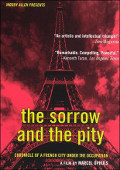
France 1969
Directed by
Marcel Ophuls
260 minutes
Rated PG
Reviewed by
Bernard Hemingway


The Sorrow And The Pity
Made for French television, Marcel Ophüls' classic documentary explores the French experience of the Nazi occupation by interviewing a wide range of people involved in it with particular focus on the small French town of Clermont-Ferrand. With a total running time of well over four hours it is not a film that everyone will immediately take to but for anyone interested in WWII it provides a richly detailed insight into one aspect of it while at a more general, and arguably more significant, level it functions as a revealing portrait of the persisting differences between people that are normally subsumed in day-to-day acquiescence but which at times can develop into overt conflict and deadly consequences.
Based on more than two years of interviews, the first part of the film provides a historical overview of the years of Vichy France, 1940-1944. The second part tries to get at the reality of that event through the personal experiences of the interviewees. Thus we meet Resistance fighters, various supporters of Marshall Pétain and Prime Minister Pierre Laval, a member of an aristocratic family who had been so impressed by Nazi rhetoric that he signed up with the German army and went off to the Russian Front, a retired German officer complacently well-pleased with his war record amongst many others.
Unusually, Ophüls' uses no captions to tell us who his subjects are but this works well as it forces us to engage with each of them in order to place them within the mosaic of the overall narrative (the only real exception is Pierre Mendès-France a former Prime Minister of France who fled to England after the fall of Paris) and to exemplify Ophüls' position that the grand narratives of history are built on small, unpremeditated contingencies.
Although Ophüls' makes no bones about the fact that France was the only European nation to collaborate with the Nazis ultimately he leaves it to the former British Prime Minister, Anthony Eden to remind us that: “One who has not suffered the horrors of an occupying power has no right to judge a nation that has”
Want something different?





